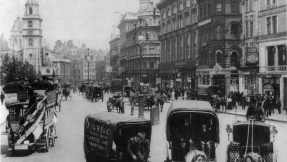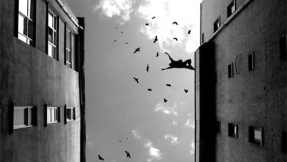Mrs. Dalloway: A Society Brooding in the Aftermath
One of the most influential people of the modernist period, Virginia Woolf’s writing style and portrayal of characters are unlike any other’s. Filled with deep contemplation and an overwhelming sense of longing and loss, each subsequent story builds off of a discussion she began in her first published novel: Jacob’s Room.
After Jacob’s Room, Woolf went on to write what would become another one of her most famous works: Mrs. Dalloway—published three years later in 1925. Much like its predecessor, Mrs. Dalloway is a novel whose narrator immerses herself within the beliefs perpetuated by society’s machinery.
But instead of doing so in the manner of a blind follower, the narrator does so as a scrutinizing commentator—a method that allows Woolf to portray the consequences of World War I on British society, and how the same government that led its people into the war is incapable of tending to its citizens in the aftermath.
This article is one of a series of three discussing Woolf’s novels, Jacob’s Room, Mrs. Dalloway, and To the Lighthouse. The form of my argument is comprised, as with my other articles, of close analyses of specific passages that reflect on Woolf’s broader messages.
Structure and Story
Much like Jacob’s Room, Mrs. Dalloway employs stream of consciousness—a manner of writing in which characters’ thoughts and perceptions are presented in random succession.

However, there are several aspects of the latter novel that sets it apart from the former: Mrs. Dalloway is set five years after the end of World War I instead of taking place in the years leading up to it. All characters—significant or insignificant—have their thoughts laid bare for the reader’s perusal, as opposed to the limitations that were placed on the reader’s perception of Jacob in the former. And instead of tracking the brief life of a male youth since childhood, the story focuses primarily on Mrs. Dalloway, her circle of acquaintances and friends, the returning soldier Septimus Smith, and their activities over the course of a day. As the narrator exposes the minds of the people she sees, the reader observes how thoughts of the war intersperse themselves among the mundane, refusing people the ability to guiltlessly move on with their lives.
The Focus of Woolf’s Critique

The notion of “society’s machinery,” as depicted in Woolf’s novels, is the idea that Woolf’s society is built on upholding certain beliefs that are systematically ingrained in its citizens, whether through institutionalized means or by conforming to the attitudes around them. While Jacob’s Room comments on the antecedents that made England’s involvement in World War I an inevitability, Mrs. Dalloway focuses on the aftermath of World War I. Specifically, Woolf explores the inability of a governing party to address the psychological consequences of its citizens in transitioning from war into peacetime, and the persistence of pre-war attitudes in preventing people from accepting the present reality.
Guilt and Longing
Throughout Woolf’s novel, a sense of longing is prevalent: “But what was she dreaming as she looked into Hatchards’ shop window? What was she trying to recover” (Dalloway 7). In this moment, Mrs. Dalloway’s attempt at “trying to recover” something evokes the sentiment of loss.

While one may interpret Mrs. Dalloway’s feeling as something mundane, given the fact that she is simply going about her daily life, the context of the aftermath of World War I may add far greater significance. For example, Woolf’s use of the word “dreaming” suggests Mrs. Dalloway’s sense of detachment from her current life, in which case, the thing which she is “trying to recover” is possibly something of great value if it had previously grounded her in the present.
Moreover, the fact that Mrs. Dalloway is looking into a window can suggest two things: firstly, if the window is to be considered in the physical sense, then it is possible that Mrs. Dalloway feels a barrier between herself and the life she currently leads; and secondly, since Mrs. Dalloway is looking “into” the window, this indicates that she can see what is on the other side, which, in turn, implies her sense of awareness that while her state of mind remains at an impasse, life continues outside of her. The significance of Mrs. Dalloway’s sense of longing and her detachment from the present reality emphasizes the effect World War I had on British citizens as they struggled to transition back into peacetime.
The idea that World War I is responsible for people’s inability to seamlessly resume their lives is implied from the fact that explicit reference to the war arises in people’s minds as they go about their daily activities: “holding out his flowers, ‘I love you.’ … Really it was a miracle thinking of the war, and thousands of poor chaps … shoveled together, already half forgotten; it was a miracle. Here he was walking across London to say to Clarissa … that he loved her” (Woolf, Dalloway 82-83). In this moment, the fact that the war surfaces suddenly in Mr. Dalloway’s train of thought reinforces the notion that the war has had a lasting impact on British citizens.

Perhaps the reason as to why Mr. Dalloway, a member of the government during and after the war years, cannot help but think of the war is because of a feeling of guilt. This can be observed in the way he refers to the dead men as “already half-forgotten”—as though the countless youths who were taught that they would be viewed as heroes were lied to, as citizens are more concerned with the effects the war has had on their own lives rather than on the lives of those around them. Mr. Dalloway’s guilt perhaps thereby arises out of a feeling of having betrayed the young men who had lost their lives.
Moreover, Woolf’s decision to have Mr. Dalloway refer to the war as a “miracle” suggests her sardonic condemnation of English society; the very idea that a war can be considered a miracle evokes the reader’s revulsion and their subsequent judgment of English government. Thus, Woolf’s thematic use of the sentiments of loss and longing in the context of the aftermath of World War I allows her to present English government as incapable of addressing changing attitudes regarding the glory of empire, as members of the government themselves struggle to reconcile with their own sense of guilt.
Reflecting on Pre-War Attitudes
Woolf’s portrayal of the people’s disillusionment with the British government reinforces the theme of condemning society’s former beliefs. As Alex Zwerdling discusses in his essay, “Mrs. Dalloway And The Social System,” the rise of the Labour Party in opposition to the Conservative-Liberal coalition in British politics is alluded to throughout Woolf’s novel. The reason for this is because the Conservative-Liberal coalition represents “‘the public-spirited, British Empire, tariff-reform, governing class spirit’” (Zwerdling 70)—the government that creates the society Woolf criticizes in Jacob’s Room, and the same government that continues to have strong influence for a brief time after World War I.
Thus, Woolf’s depiction of British citizens as disenchanted with the government suggests Woolf’s condemnation of society’s machinery. In addition to moments where Woolf illustrates the difficulties people have in resuming their lives, Woolf incorporates scenes in the novel where the current British government is portrayed as responsible for propelling England into war: “for in all the hat shops and tailors’ shops strangers looked at each other and thought of the dead; of the flag; of Empire … For the surface agitation of the passing car as it sunk grazed something very profound” (Dalloway 13).

In this instance, citizens react guiltily to seeing a car carrying a person representative of the British state. The fact that Woolf claims “strangers looked at each other” and all thought of the same thing—the consequence of following a government that facilitated their involvement in war—implies citizens’ awareness that society has been systematically taught to believe in glorifying empire. Moreover, because Woolf refers to the car as “surface agitation,” it may be implied that the notion of glorifying empire is so ingrained in the citizens’ mentality that they do not need to spend a significant amount of time trying to understand what the car represents.
But the fact that Woolf claims this surface agitation “grazed something very profound,” invokes the citizens’ shared sense of guilt; they are now aware that the painful experience of war arose as a result of their blindly following society’s beliefs. Another scene in the novel that evokes the same theme is when Peter Walsh imagines a military procession comprised of male youths: “and life, with its varieties, its irreticenses, had been laid under a pavement of monuments and wreaths and drugged into a stiff yet staring corpse by discipline … one might laugh; but one had to respect it” (Woolf, Dalloway 37).

This moment is relevant to the theme of individuals blindly following society’s beliefs for it elicits the notions of conformity and brainwashing. Peter’s claim that all the “varieties” of life “had been laid under a pavement” suggests that whatever differences there were that distinguished one person from another ceased to exist after they had been taught to step in-line with the government’s call for empire. The idea that such thinking had been imposed rather than willingly accepted is evoked by Peter’s use of the phrase “had been laid under,” which suggests a prioritizing of “monuments and wreaths” over “life, with its varieties, its irreticenses.”
Moreover, Peter’s use of the words “drugged” and “corpse” reinforce the notion that people were purposefully made to think a certain way at the cost of whatever qualities they had that made them “living” or “human.”
The “Triumph” of Society’s Machinery
Thus, once people experienced war by fighting or losing a loved one, the realization that the beliefs they once upheld only perpetuate a self-destructive mentality led citizens to internally condemn an apathetic government. However, while citizens generally either repressed their guilt for upholding society’s beliefs and their need for change, other individuals proved incapable of resuming their lives completely and sought escape through suicide.
Woolf’s portrayal of Septimus Smith and his transition from the battlefield to the city of London illustrates the callousness which society dealt with male youths who had gone off to war believing they would be treated as heroes only to be treated with indifference when they returned. As Karen L. Levenback states in her book, Virginia Woolf and the Great War, “Living in the postwar world, a combatant, such as Septimus, who lacked a visible wound was expected ‘to get on with it’ unobtrusively and discreetly” (61).
Thus, Septimus’ treatment by society can be interpreted as a kind of betrayal in society’s refusal to publicly acknowledge its fault for involving citizens in the war, and disregarding the psychological effects war had on returning veterans. Woolf’s narration of Septimus’ thoughts on society conveys the psychological consequences the individual experiences as a result of war: “One cannot bring children into a world like this. One cannot perpetuate suffering, or increase the breed of these lustful animals, who have no lasting emotions, but only whims and vanities” (Dalloway 64).

In this instance, Septimus condemns the act of procreation as he believes doing so only perpetuates society’s machinery, wars, and misery. Septimus refers to society as comprised of “lustful animals,” the significance of which is that he believes society is made up not of rational thinking people, but mindless creatures who desire one thing: to glorify the British empire despite the consequences on the individual. Thus, when Septimus comes to the conclusion that “the world is without meaning” (Woolf, Dalloway 63), he decides suicide is his only option.
Peter Walsh’s approbation of the ambulance carrying Septimus’ dead body as “one of the triumphs of civilization” (Dalloway 108), suggests Woolf’s sarcastic bitterness. For by implicating society’s machinery as responsible for Septimus’ suicide, she conveys the unnaturalness of supposedly “natural” institutions. Moreover, Woolf’s description of how Septimus’ suicide is taken care of suggests how callous and quick society is to cover up evidence of its faults: “That was civilization. It struck him coming back from the east—the efficiency, the organization, the communal spirit of London” (Dalloway 108).
The fact that Woolf refers to the handling of Septimus’ death as showcasing society’s “efficiency” and “communal spirit” suggests how everyone is part of the same machinery and systematized to take care of those citizens who publicly illuminate and condemn society’s faults. Therefore, Woolf’s Mrs. Dalloway uses the themes of longing and loss, the guilt of society’s citizens, and Septimus’ perceptions of society to present the consequences of fulfilling society’s ambitions. Woolf’s commentary critiques society’s machinery and the inability of the British government to remedy the effects its pre-war attitudes had on people’s lives.
Works Cited
Levenback, Karen L. Virginia Woolf and the Great War. New York: Syracuse University Press, 1999. Print.
Woolf, Virginia. Mrs. Dalloway. Feedbooks, n.d. PDF file.
Zwerdling, Alex. “Mrs. Dalloway And The Social System.” PMLA: Publications Of The Modern Language Association of America 92.1 (1977): 69-82. MLA International Bibliography. Web. 26 Mar. 2014.
What do you think? Leave a comment.











Great thesis. I hung on every word and loved the characters in this book.
Thanks for the read! 🙂
My AP English class was forced to read this book, so we can analyse ‘The Hours’, which is heavily based off this terrible terrible book. There were I think maybe 2 or 3 people in our class that were actually reading it, everyone else had given up the torture. Okay, Woolf does have a brilliant writing style, but she forgot the most important thing in a novel…THE STORY!
You should pick it up now and read it, might change your mind.
I didnt like this book as much as I liked ”THE HOURS”but it was still ok to read.
Objectively speaking, it’s not a terrible book by any means. Woolf’s writing is purposeful even in the tiniest details she uses to form her sentences and ideas. If you’re reading the book for “pleasure,” you might not enjoy it–I certainly didn’t, but I can greatly appreciate what she was able to do in her writings. To each his own. Thanks for the read!
A masterpiece by one of the greatest writers in English literary history!
Agreed 🙂
Virginia Woolf style of writing was really different and unique.
Agreed. There’s nothing else quite like it.
I thought that was an interesting read, with a lot of good visuals to go along with the story. Very nicely written
Thank you very much 🙂
Virginia Woolf writing can relate to people that lost love ones due to war or did something to someone that so terrible it can create guilt for that person and used alcohol or drugs to forget about it.This article is very well done
Thanks for the read 🙂
One of the best books for refreshing one’s writing skills!
Note that Septimus exhibited symptoms of psychosis which suggested schizophrenia. With this character, we get a broad view of a dismissed soldier, which the writer here brings out; on another level, we see inside the mind of a sick person.
There’s definitely a lot of ways the book and its characters can be interpreted. So much scholarship has been written on this novel, and Woolf’s works in general, that you can find a lot on just about anything. Thanks for the read 🙂
Both this and Jacob’s Room post was interesting to read. This book though is like some movies that you want to watch again and again and every-time you find something new, you understand more…
Thank you for reading them :). My article for Woolf’s “To the Lighthouse” will most likely come out within the next week–if you’re interested in learning more about another Woolf novel, feel free to take a look.
And I agree, books with this much depth–I don’t think it’s possible to pick up on all the little tiny things on the first read. I think that’s one of the things that show how impressive of a writer Woolf was.
Definitely! It’s the kind of novel that really makes you appreciate great literature.
Yup 🙂 thanks for the read!
Loved your analysis of Mrs. Dalloway. I remember reading it in when I was in undergrad. I remember Woolf’s writing being so unique. It was one of the first books I read when studying the technique of stream of conciousness. In my opinion, it’s what makes the book stand out so much.
Thank you so much! And absolutely, that’s probably the thing that Woolf’s writings is most well known for
I think attitudes in post WWI literature are incredibly fascinating. I really enjoyed your article! I was wondering how you felt about Peter Walsh and his role in this story.
Thanks again for your comment :). I honestly don’t remember too much about Peter when I read it :P. At the time, I was more focused on the general themes in Woolf’s novels rather than the characters themselves. The characters in To the Lighthouse and Jacob in Jacob’s Room are probably the only characters in Woolf’s works that I’ve paid more attention to. Especially since Mrs. Dalloway is so political in its writing, I just found myself focusing more on the implications of characters’ dialogues on society than the characters themselves.
Thank you for the commentary on Virginia Woolf’s Mrs. Dalloway. I do wish to offer two important items to the comment stream: first, Jacob’s Room was not Woolf’s first novel, it was her 3rd novel; and secondly, Mr. Dalloway’s miracle was not the Great War, he was alluding to the miracle of having survived the war with the emotion of love intact.
I do adore this text, such a fascinating insight to both gender roles of the period and mental illness. I found it a particularly interesting text to read alongside the bibliographies of her life, so many applied readings fit with this text. Woolf really was a such a subtle author.
Great essay, always wonderful to see Woolf being discussed.
I think if I had have first read this on my own I a. would not have finished it, and b. not have drawn the connection that it was a criticism of WWI.
But, I read it for a literature class in uni that specifically looked at novels about war which helped to offer context when tackling Mrs Dalloway. Once you get past how difficult it is to read, its a very insightful novel!
Great article.
It sounds like those within British society at the time entrenched themselves, even redoubled themselves into an emotionless expression in the face of tragedy.